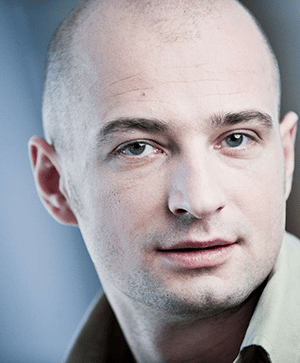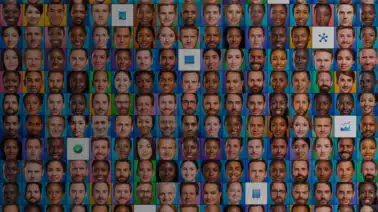How one Udacity graduate became a superhero mentor, and built a great career in the process!

Udacity mentors do incredible work. They regularly go above and beyond for students, in the classroom and on Slack, supporting Nanodegree program students with the one-to-one help and feedback they need to ace their studies. This week we want to celebrate the hard work and achievements of one of these exceptional people.
Meet Karol Zyskowski. Even by the high standards of our mentors, Karol is a superhero. From his home in Berlin, Germany, he has completed over 1,300 one-to-one mentoring sessions with Udacity students, and written over 12,000 advice posts! This is the story of how Karol became a mentor, and what the experience has meant for his own career development as a front-end developer.
Learning to Program
Karol’s journey to programming has been filled with twists and turns. He was an apprentice land surveyor. He completed a Master’s degree in political science. He worked in public relations, and then in event management. When he decided to change careers yet again, he chose to explore the possibilities of a career in coding. He found Udacity and planned to try learning new programming skills while he worked.
One Course Later, Hired by Google!
Karol completed his first Udacity course—Data Wrangling with MongoDB—and posted his completion certificate on LinkedIn. The very same day, he was contacted by a recruiter. They were looking to fill a temporary data role with Google, and thought Karol’s skills were a great fit. He hadn’t expected interview offers to come so quickly, but said “yes!” to the opportunity.
The Front-End Web Developer Nanodegree Program
He worked at Google’s Dublin, Ireland office for a number of months, working as a “Legal Removals Specialist” on a privacy project. He returned home to Berlin sure that he wanted a long-term tech career. He’d learned a lot, but knew he needed to master a much deeper range of programming skills. He’d enjoyed the learning experience of his first Udacity course, but now needed something with full immersion in programming. That’s when he enrolled in the Front-End Web Developer Nanodegree program.
Becoming a Udacity Mentor
 Karol became active in the program’s online community—leading regular workgroups to cooperate on projects and talk through programming challenges. He was a prolific contributor to the program’s forums and Slack channels, answering other students’ questions about their studies. He realized he had a talent for providing clear, useful advice on how he’d overcome the challenges of the program’s projects.
Karol became active in the program’s online community—leading regular workgroups to cooperate on projects and talk through programming challenges. He was a prolific contributor to the program’s forums and Slack channels, answering other students’ questions about their studies. He realized he had a talent for providing clear, useful advice on how he’d overcome the challenges of the program’s projects.
His commitment to providing high caliber advice was impressive, and Udacity asked him to start contributing formally as a one-to-one mentor after he graduated. Karol saw it as an excellent opportunity to add programming experience and soft skills to his resume.
“I’ve always felt that it’s totally possible to change your professional orientation. But it’s definitely better to have a strong partner, like Udacity, in the background. You build valuable experience and it ultimately makes you more interesting to recruiters.”
He loved the challenge of thinking through students’ questions and helping them succeed, and quickly took on more mentoring responsibilities. He took pride in being responsive to student queries that could come at any time of the day or night, and he made a point of meticulously preparing for one-to-one sessions so he could be as helpful as possible.
A Humble and Audacious Goal
Karol set himself the goal of completing 1,000 mentoring sessions with students from around the world. He believed it was an ambitious target that would give him time to really develop his mentoring approach with people from different countries and cultures.
“An important thing about mentoring was how it fit with my own aim to become a better programmer.”
Karol realized that his daily interactions with students were not only benefiting their studies. He was also growing as a professional developer.
“Mentoring meant I was coding every day. I was troubleshooting students’ code; learning new techniques so I could explain them clearly; trying to stay ahead of new programming developments. This made me a better mentor, but it also made me a more competent programmer!”
And he wasn’t just building programming skills. Karol was also developing his networking and communication abilities. He started organizing virtual meet-ups for Udacity’s global mentors via video conference every month. With a few other volunteers, he moderated discussions about what members of the group were working on, and helped share ideas about mentoring best-practices.
The React Nanodegree Program
Karol’s dedication meant he surpassed his own target, eventually delivering over 1,300 mentoring sessions. Satisfied he’d built some really substantial industry experience, he started making plans for his next career step. His first move was to enroll in Udacity’s React Nanodegree program. He liked how the React library forces a user to structure code and syntax. His aim was to stretch his programming experience in a new direction and then look for front-end developer roles while he continued mentoring.
Another Nanodegree Program Later, Hired!
But Karol’s expectations for a slow and steady transition were due for a surprise, because when he announced his graduation from the React program on LinkedIn, he rapidly received interview offers for senior developer positions.
“Recruiting managers were really impressed by my mentoring background. They could see I’d built a load of skills there—from coaching and leadership skills, to time management and communication. They actually had team leader roles that these skills really suited, but I told them I was keen to start at the bottom. I know this seems unusual, but I wanted to gain practical experience working with React first!”
Karol accepted an offer to work as a front-end developer, and he recently started work with his new company. He was sad to leave his mentoring role, but is excited to keep developing his programming skills.
“The most important thing for me now is to affirm myself as a professional developer. I want to be sure I’ve made it, and solidify my knowledge. Mentoring showed me that there is always more to learn. And I’m really aware that practical experience is the best way to build my skills. That is, after all, what I always told my students.”
Thank You, and Congratulations, From Udacity!
Thank you Karol, for sharing your story, and for all your incredible work as a Udacity mentor! You’ve made a really positive impact on the learning experiences of so many students. And you’ve turned your impressive mentoring experience into an exciting new career.
Congratulations!



